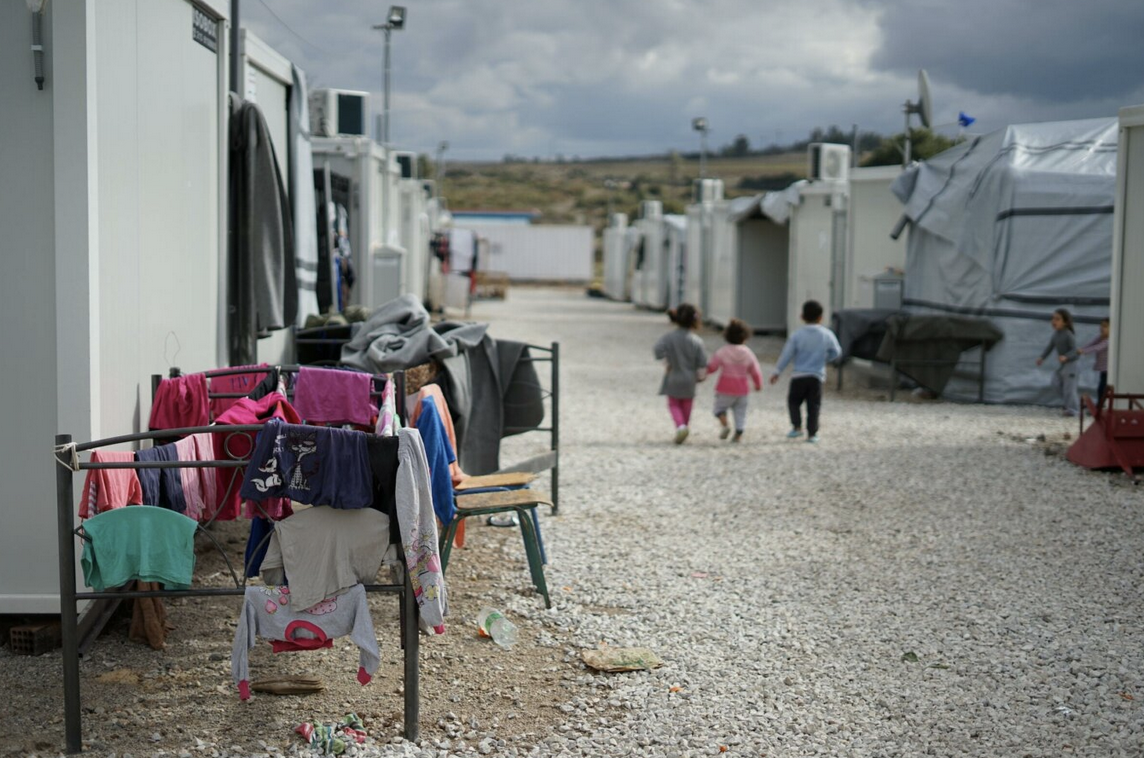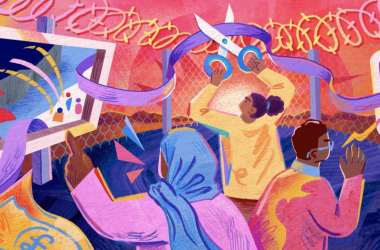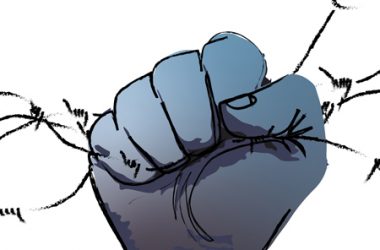Asylum for Sale is a searing indictment of profit-making in the asylum industry. Harry Browse talks to the book’s co-editor, Siobhán McGuirk.
By Harry Browse
Now Then Magazine
2 December 2020
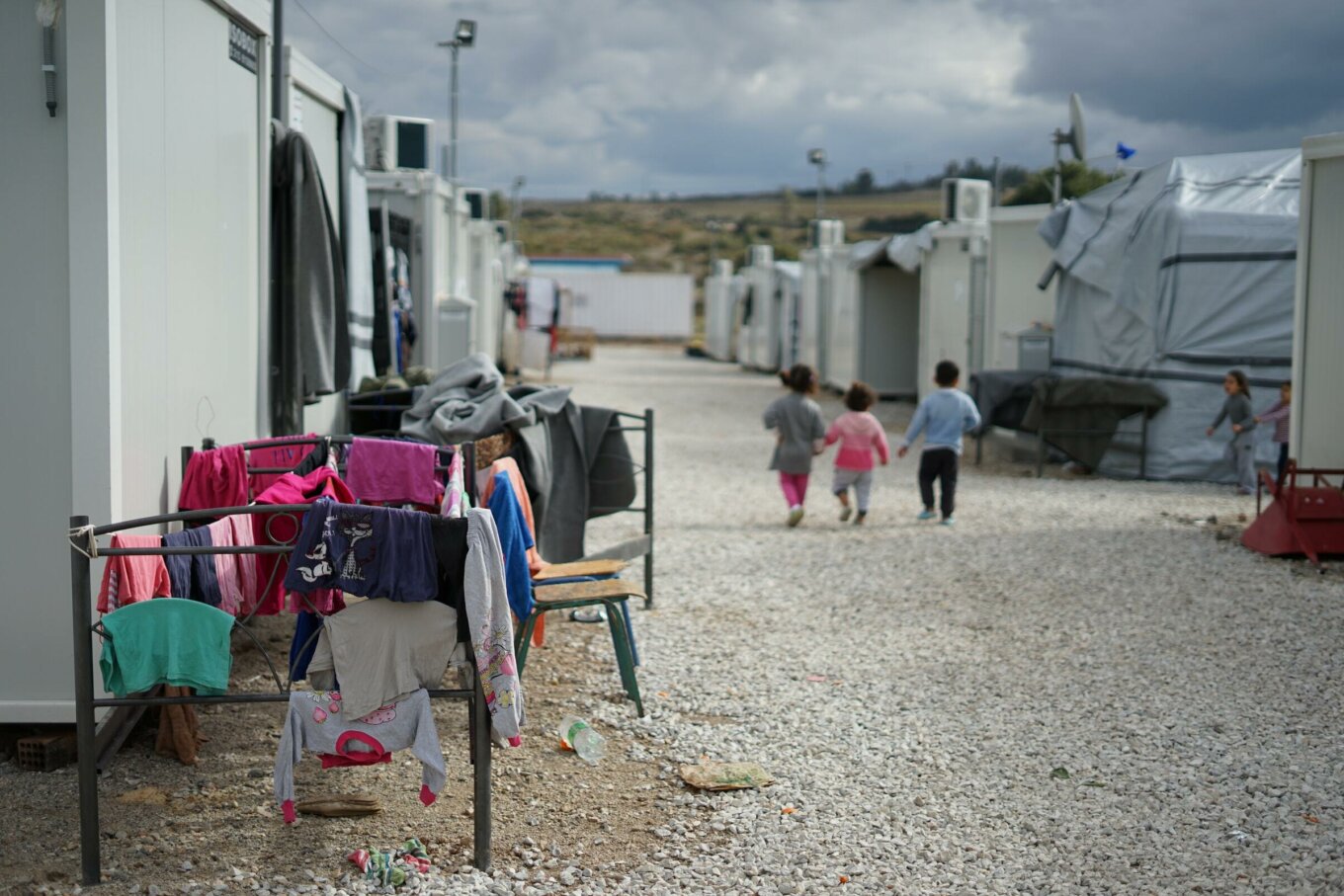
“You pay for every step you take,” writes Uyi, an artist and asylum seeker from Nigeria, who was rescued from a dingy carrying 111 people attempting to reach Europe. “You pay to die. That is how it is: you pay to die.”
His striking account of maltreatment and profiteering in Asylum for Sale: Profit and Protest in the Migration Industry joins a broad collection of voices in this striking polemic against the systems of social and financial capital that are currently shaping the “migration industry.” With a no-deal Brexit, the climate crisis and a Biden presidency around the corner, and considering the likely impact these events will have on migration systems around the world, the book is well-timed.
“The story we’re telling is quite complex as it is,” says Siobhán McGuirk, academic and co-editor of Asylum for Sale. “We didn’t want to just suggest that it could be told through academic discourse, or testimony or essays alone, but to look at the culture change that is happening on many different artistic levels as well.”
Through a refreshing mix of mediums, including photo essays,
theoretical analysis and illustration, the book pushes back against
dominant discourses on the topic, exposing the asylum process to be a
system of profit-making that operates at the expense of human lives.
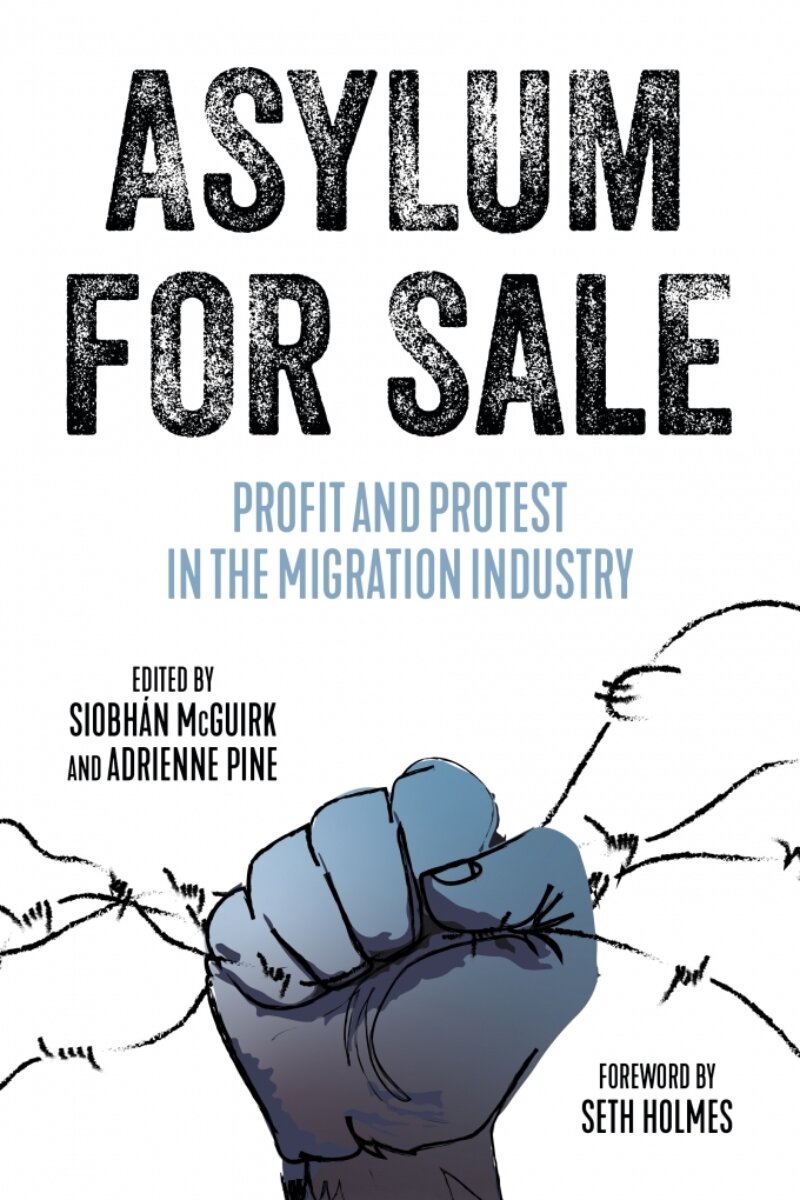
From the people smugglers demanding extortionate pay-outs for a
desperate chance at escape, the advancement of border surveillance
technology and the private firms that benefit, to the institutions
profiteering from the indefinite detention of asylum seekers, the book
contextualises the contemporary asylum experience as one shaped by
neoliberal capitalism.
“We are so focused on these kind of questions about the state’s moral obligation to help refugees or their legal obligation to help refugees,” says Siobhán. “We weren’t talking enough about how these capitalist forces were creating refugees on the one hand, and then profiting, or – we call it – ‘care washing’ on the other.”
The second section of Asylum for Sale examines the ways in which the NGOs, charities and law firms providing support for those seeking asylum can both resist and perpetuate the current system. These “moral economies” within the industry conceal a seemingly irreconcilable tension: how do you resist the system without risking the support available to those impacted by it?
This is a topic explored in Siobhán McGuirk’s anthropological account of a small US organisation working to provide material support for LGBT asylum seekers and the group’s preparations for a regional pride parade.
McGuirk describes how Jennifer, the leader of the organisation, a “white US citizen who felt called by her faith to help LGBT asylum seekers,” proposed that those asylum seekers walking in the parade – the very people receiving support from the charity – wear brown paper bags over their heads during the procession.
In reality, if the UK was to stop bombing other countries […] then we wouldn’t be seeing those people fleeing those places in search of a better life
According to Jennifer, the brown paper bags aligned with an image of LGBT asylum seekers that the organisation wanted to project; of them as “voiceless” immigrants, unable to show their identities and awaiting “freedom in the United States”.
While the rest of the group argued that the idea felt dehumanising, suggesting instead that participants wear rainbow masks during the parade as a symbol of their pride, Jennifer remained stubborn, driven by the philosophy that “pulling on heartstrings opens purse strings”. Styling the chapter as a play of five acts, McGuirk exposes the performativity of certain aspects of the migration industry, unveiling a story of actors falling into their roles without the narrative ever truly changing.
“From the charities’ perspective, they feel they have to emphasise the particular vulnerability of a certain group of people because otherwise they’ll get left off the list,” says Siobhán. “We see this in my case with LGBT asylum seekers, but we also see this with children.
“This fetishisation that takes place within this context of depicting people as extremely vulnerable also invokes the fallacy that there are limited resources and there is limited space [and the argument that] we can’t accept all migrants.
“It justifies the idea that there has to be some kind of selection process. Whereas in reality, if the UK was to stop bombing other countries, and selling bombs to other nations to then bomb those countries, and if they were to discontinue our extractive economic practices all over the world, then we wouldn’t be seeing those people fleeing those places in search of a better life.”

According to the UN Refugee Agency, 1% of the world’s population
is displaced and two million applications for asylum were made in 2019.
Recalling her own experiences writing letters of support for asylum
applications in the US, Siobhán argues that getting people through the
system often takes priority over resistance.
“Immigration judges, adjudicators, officers and the people who are doing the interviews and granting asylum – the temptation is to say what you think they want to hear,” she observes.
“You might help one case be successful, but in the long run you are feeding into a narrative, or kind of reinforcing through writing those letters, that this is what to expect. It’s saying, these expectations are wrong but we’re going to meet them anyway.
“That said, it’s important to keep writing those letters and to find those supporting reports and to hear expert witnesses’ accounts in dossiers on detention conditions. In some ways you have to keep working within the system in order to transform it,” she says, invoking Marzena Zukowska’s chapter on immigration bail bonds in the US justice system, in which she discusses resistance in terms of “reform to revolution”.
“It’s about taking reformist steps because abolition is not immediately possible, but the general direction of those steps is towards revolution,” says Siobhán. “We’re thinking about how to be activist and be assertively supportive of cases without re-inscribing the same criteria that’s being used to exclude other people.
“When providing supporting letters or documentation [to an asylum application], this starts with avoiding any kind of pathologising of the people of a country, or suggesting that being granted asylum in the United States is going to be ‘lifesaving’ for that person.
“You can say that it is very important and that it will prevent them from suffering those specific harms, but there’s no need to bring up this fantasy of safety in the United States.”
We need to keep pushing the Biden-Harris administration a lot further
Through powerful witness accounts, Asylum for Sale reveals the exploitative and often traumatic process of seeking refuge in the United States. It was the Obama-Biden administration who started separating families at the border, earning the former president the nickname ‘Deporter-in-Chief’. These policies continued under Trump’s administration, exacerbated by his isolationist agenda. Siobhán hopes such policies will be reversed by the new Biden administration.
“Undoing Trump’s rhetoric is not enough, and we need to keep pushing the Biden-Harris administration a lot further.” The election result was therefore only the start of a bigger resistance mission.
“This includes thinking about the reasons why people flee their homes; the factors that make life so miserable that people are compelled to leave their homes. That includes examining free trade deals that force wages down in central American countries; that includes man-made climate change and reassessing the lack of support for countries impacted most severely.”
Though the general message of “reform to revolution” may not be the transformative vision that readers may expect from the book, Asylum for Sale is a thorough yet accessible insight into the influences of neoliberal capitalism on asylum regimes around the world.
In compiled fragments, like shards of a broken mirror, the book signals where action is needed, and its stories of grassroots resistance offer a glimpse of the hope that change is possible.
Siobhan McGuirk – In addition to her academic publications addressing gender and sexuality, migration, and social justice movements, McGuirk is an award-winning filmmaker, curator and editor for Red Pepper magazine. Her writing has appeared in Teen Vogue, Rewire News, and Australian Options. She received her Doctorate in Anthropology from American University in 2016 and holds a Masters in Visual Anthropology from the University of Manchester. She is a Postdoctoral Researcher in Anthropology at Goldsmiths, University of London.
Adrienne Pine is a critical medical anthropologist whose work has explored the embodiment of structural violence and imperialism in Honduras, cross-cultural approaches to revolutionary nursing, and neoliberal fascism. She has served as an expert country conditions witness in around 100 asylum cases over the past fifteen years. Adrienne is an assistant professor at the American University and author of Working Hard, Drinking Hard: On Violence and Survival in Honduras.
Check out Adrienne Pine and Siobhán McGuirk’s & new book:

